Gil Hodges is not only an important part of New York Mets history but also essential to the game of baseball.
It was April 2, 1972, when New York Mets manager Gil Hodges left this world. Following an Easter Sunday golf game with his fellow coaches, Hodges collapsed on the way back to the hotel.
Hodges is one of those players in MLB history everyone seems to respect. Because he made his mark both as a player and manager, his legacy spanned multiple generations.
He was more than just a man who showed up to work and did his job. Hodges did it well and went beyond the usual call of many athletes.
More from Rising Apple
- NY Mets Monday Morning GM: The middle is no place you want to be
- NY Mets News: Marcus Stroman sees “potential fit” with the Angels
- NY Mets were too “seek” and not enough “destroy” last winter
- NY Mets: 1 trade target to consider from each 100-loss team
- NY Mets: Top 12 free agents the team should look to sign this winter
The Indiana-born kid began his MLB career in 1943 with one game for the Brooklyn Dodgers. He didn’t play another until 1947 when he returned from military service during WWII.
During those missing MLB seasons, Hodges was an anti-aircraft gunner who fought at the battles of Tinian and Okinawa. He received the Bronze Star Medal with Combat “V” for his heroism under fire.
When he was discharged from the marines in 1946, Hodges had a chance to resume his baseball career. He made his Dodgers return with 28 games in the 1947 season, the same year Jackie Robinson famously broke the color barrier.
It seemed to take Hodges some time to get used to baseball again—or at least major league pitching. He hit only .156 in 1947 before improving to .249 in the 1948 campaign.
Hodges’ career went to a whole new level in 1949. This year, he hit .285 while knocking 23 home runs and driving in 115. From this season until 1955, he was an All-Star with no fewer than 23 home runs and always reaching 100 RBI.
In 1955, Hodges won his first World Series when the Dodgers took down the New York Yankees. In 1959, now playing for the Los Angeles Dodgers, he won another. This time, it was the Chicago White Sox who fell victim to his club.
Hodges eventually made his way back to New York and National League baseball. He played 65 games for the Mets between 1962 and 1963. He actually ended up becoming the manager of the Washington Senators in 1963 where he would stay through the 1967 season.
New York did come calling for Hodges again. In 1968, he became the Mets’ skipper.
The Mets were still trying to crawl to .500 at this point. There were many positives from his first year with the club as manager. Their 73-89 record provided plenty of hope.
A year later, those hopes were realized. The Mets went 100-62 and gave the franchise one of the greatest seasons imaginable.
Hodges was the kind of old-school manager with a forward way of thinking. He was known for platooning players regularly and utilizing every piece of the roster. Before there were nerds sitting in offices sending out spreadsheets to the general manager, there was Hodges’ brilliant mind doing it solo.
The Mets went 83-79 in 1970 and 1971, missing the playoffs both times. Still, Hodges was the manager. The core was still in place. There was a chance to win another for New York.
Tragically, it never happened as Hodges passed away shortly before the start of the 1972 campaign.
Hodges remains a fixture in the story of baseball. Whenever there’s a Hall of Fame debate, his name is one of the first to come up. Why isn’t he in there?
For what he did as a player and the way he made an expansion franchise legitimate, Hodges is no question someone who belongs in Cooperstown. This isn’t a case of oversentimentality due to his untimely death. The man passed away nearly 50 years ago and even today, his players and fans of the game argue on his behalf.
Want your voice heard? Join the Rising Apple team!
You cannot tell the story of baseball without mentioning Hodges. This reason alone cements his spot in the Hall of Fame whether he has a plaque there or not.
